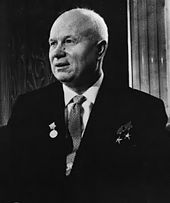- We will bury you
-
For the comic book, see We Will Bury You (comics).
"We will bury you!" ("Мы вас похороним!", transliterated as My vas pokhoronim!) was a phrase famously used by Soviet premier Nikita Khrushchev while addressing Western ambassadors at a reception at the Polish embassy in Moscow on November 18, 1956.[1][2][3]
The actual verbal context was: "Whether you like it or not, history is on our side. We will dig you in" ("Нравится вам или нет, но история на нашей стороне. Мы вас закопаем"). In his subsequent public speech Khrushchev declared: "[...] We must take a shovel and dig a deep grave, and bury colonialism as deep as we can".[4] Later, on August 24, 1963, Khrushchev remarked in his speech in Yugoslavia, "I once said, 'We will bury you,' and I got into trouble with it. Of course we will not bury you with a shovel. Your own working class will bury you,"[5] a reference to the Marxist saying, "The proletariat is the undertaker of capitalism", based on the concluding statement in Chapter 1 of the Communist Manifesto: "What the bourgeoisie therefore produces, above all, are its own grave-diggers. Its fall and the victory of the proletariat are equally inevitable". Khrushchev repeated this Marxist thesis at a meeting with journalists in the U.S. in September 1959. However many Americans interpreted the quote as a nuclear threat.[6]
Mikhail Gorbachev wrote in his book Perestroika and New Thinking for our Country and the World that the image used by Khrushchev was inspired by the famous discussions among Soviet agrarian scientists in the 1930s, nicknamed "who will bury whom". Khrushchev's phrase was also used as the title of Jan Šejna's book on communist Cold War strategies. The phrase also appears in Sting's song "Russians", as well as the Dave Matthews Band song "Don't Drink the Water".
A similar famous Khrushchev phrase was made to the then U.S. Vice President Richard Nixon at an American technology exhibit in Moscow: "In 7 years we will reach the level of America. When we catch up and pass you by, we'll wave to you."[citation needed]
See also
References
- ^ "We Will Bury You!", Time Magazine, November 26, 1956
- ^ "Khrushchev Tirade Again Irks Envoys", The New York Times, Nov. 19, 1956, p. 1.
- ^ The quote, cited on Bartleby.com and QuotationsPage.com.
- ^ Nikita Sergeevich Khrushchev, Sergeĭ Khrushchev, George Shriver, Stephen Shenfield. Memoirs of Nikita Khrushchev: Statesman, 1953-1964, Penn State Press, 2007, p. 893
- ^ Nikita_Khrushchev on QuotationsPage.com
- ^ James Stuart Olson, Historical dictionary of the 1950s, Greenwood Publishing Group, 2000, p. 157
External links
- Comments by Stephen Pearl, Chief of the English Interpretation Section of the U.N. in New York from 1980 to 1994. (On Internet Archive.)
Categories:- Foreign relations of the Soviet Union
- Soviet Union–United States relations
- Soviet phraseology
- Diplomatic incidents
- 1956 in the Soviet Union
- Nikita Khrushchev
- 1956 in international relations
- Cold War speeches
Wikimedia Foundation. 2010.

